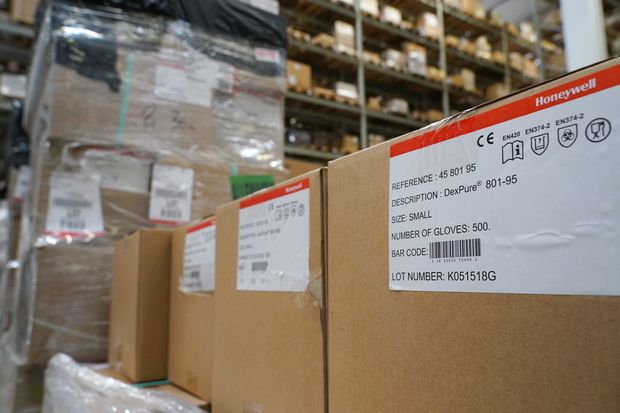Text size

About half of businesses recently surveyed are “majority manual operations” when it comes to warehouse fulfillment.
Sean Gallup/Getty Images
Amazon.com’s
Prime shipping days kick off at midnight, just in time for the holiday shopping season.
Warehouses and delivery networks are already stressed by the surge in e-commerce resulting from the global pandemic. That means the 2020 holiday season might be rocky for shoppers not ordering early. But for companies selling warehouse-automation equipment, 2020 could turn out to be a tipping point.
Baird analyst Rick Eastman has followed automation technologies for decades and he sees higher growth rates coming. One of the faster growth areas he highlighted recently was warehouse automation driven by an “e-commerce super cycle of investment.”
That bodes well for
Honeywell International
(ticker: HON). It is a big provider of warehouse-automation equipment. The company bought Intelligrated in 2016 for $1.5 billion. Intelligrated “designs, manufactures, integrates and installs complete warehouse automation solutions,” according to company documents.
Intelligrated recently commissioned a survey of its customers to determine the state of warehouse automation, polling 434 professionals across several industries. What it found confirms Eastman’s assessment.
For starters, Intelligrated uncovered some problems. Businesses are worried about rising costs and keeping up with technological change. Importantly, almost one-quarter of respondents said their company’s technological progress is falling short of customer demand.
Enter automation. Half of the survey respondents think it would help. Every business employs some level of automation. Still, about half of businesses surveyed are “majority manual operations” when it comes to warehouse fulfillment. Looking ahead, two-thirds of respondents expect to increase their automation spending over the next few years.
That can benefit companies besides Honeywell, including:
Zebra Technologies
(ZBRA),
Altra Industrial Motion
(AIMC) and
ATS Automation Tooling Systems
(ATA.Canada).
Honeywell and Zebra both trade for more than 20 times estimated 2021 earnings. The other two trade for less than 15 times earnings. The group is flat year to date, although Altra and Zebra have gained, while ATS and Honeywell have dropped. Over the past few years, the average annual return of the four is about 12%, similar to gains of the overall market.
Barron’swrote positively about Honeywell shares in November 2019. A higher levels of automation was part of our argument. Since then, Honeywell stock is down about 3%, compared with 14% and 4% respective gains of the
S&P 500
and
Dow Jones Industrial Average.
We didn’t see a pandemic coming. And one of Honeywell’s largest and most-profitable business segments is commercial aerospace. Air travel demand has been decimated by Covid-19. U.S. airport traffic fell more than 60% year over year this past Sunday, more than 210 after a national emergency was declared in March because of the health dangers.
Other aerospace stocks, including
Boeing
(BA) and
General Electric
(GE), are off about 44% on average over the same span.
Intelligrated is now part of Honeywell’s safety-and-productivity-solutions business segment, which generates about $6.1 billion in sales and 13% operating profit margins. Wall Street expects Honeywell to generate about $32 billion in sales during 2020.
Write to Al Root at [email protected]